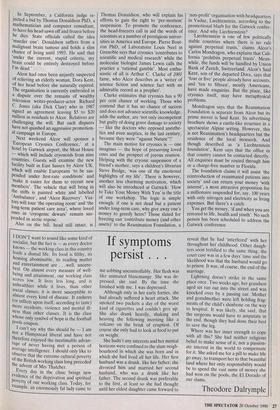If symptoms
persist . . .
I DON'T want to sound like some kind of socialist, but the fact is — as every doctor knows the working class in this country leads a dismal life. Its food is filthy, its housing abominable, its reading matter and entertainment are . . .well, uncere- bral. On almost every measure of well- being and attainment, our working class scores low. It lives less long, and is unhealthier while it lives, than other social classes; it is more susceptible to almost every kind of disease. It endures (or inflicts upon itself, according to taste) more accidents, violence and mental ill- ness than other classes. It is the class whose only symbol of hope is the football pools coupon.
I can't say why this should be — I am not a Hampstead liberal and have not therefore enjoyed the inestimable advan- tage of never having met a person of average intelligence. I should only like to observe that the extreme cultural poverty of the British working class long preceded the advent of Mrs Thatcher.
Every day in the clinic brings new evidence of the deprivation and spiritual Poverty of our working class. Today, for example, an enormously fat lady came to me sobbing uncontrollably. Her flesh was like animated blancmange. She was de- pressed, she said. By the time she finished with me, I was depressed.
Although only in her early forties, she had already suffered a heart attack. She smoked two packets a day of the worst kind of cigarettes and couldn't give up. She also drank heavily, shaking and heaving the following morning like a volcano on the brink of eruption. Of course she only had to look at food to put on weight.
She hadn't any interests and her mental horizons were confined to the slum neigh- bourhood in which she was born and in which she had lived all her life. Her first husband was a drunk, like her father; she divorced him and married her second husband, who was a drunk like her father. The second drunk was preferable to the first, at least so she had thought until her eldest daughter came forward to
reveal that he had 'interfered' with her throughout her childhood. Other daugh- ters soon testified to the same thing; the court case was in a few days' time and the likelihood was that the husband would go to prison. It was, of course, the end of the marriage.
Lightning doesn't strike in the same place once. Two weeks ago, her grandson aged six ran out into the street and was knocked over by a passing car. Mother and grandmother were left holding frag- ments of the child's shinbone on the way to hospital. It was likely, she said, that the surgeons would have to amputate in the end, though they had done their best to save the leg.
Where was her inner strength to cope with all this? She had neither religious belief to make sense of it, nor a passion- ate interest in the world to compensate for it. She asked me for a pill to make life go away, to transport her to that beautiful land where her only responsibility would be to spend the vast sums of money she had won on the pools, the El Dorado of our slums.
Theodore Dalrymple


























































 Previous page
Previous page